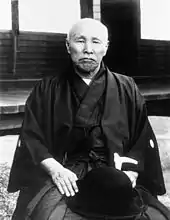Rikken Kaishintō 立憲改進党 | |
|---|---|
| Leader | Ōkuma Shigenobu |
| Founded | April 16, 1882 |
| Dissolved | March 1, 1896 |
| Merged into | Shimpotō |
| Headquarters | Tokyo |

The Rikken Kaishintō' (立憲改進党, Constitutional Reform Party) was a political party in Empire of Japan. It was also known as simply the Kaishintō.
The Kaishintō was founded by Ōkuma Shigenobu on 16 April 1882, with the assistance of Yano Ryūsuke, Inukai Tsuyoshi and Ozaki Yukio. It received financial backing by the Mitsubishi zaibatsu, and had strong support from the Japanese press,[1] and urban intellectuals.[2]
The Kaishintō pursued a moderate approach, calling for a British-style constitutional monarchy within the framework of a parliamentary democracy. In a speech Ōkuma gave at the inauguration of the party, he emphasized the symbolic role of the monarch in the type of government he envisioned. He also argued that those extremists who supported having the emperor directly involved in political decision-making were in fact endangering the very existence of the Imperial institution.[3]
In the first General Election of 1890, the Kaishintō won 46 seats to the Lower House of the Diet of Japan thus becoming the second largest party after the Liberal Party (Jiyūtō).
Afterwards, the Kaishintō adopted an increasingly nationalistic foreign policy, and in March 1896 merged with several smaller nationalist parties to form the Shimpotō.
Election results
| Election | Leader | Seats | +/- | Status |
|---|---|---|---|---|
| 1890 | Ōkuma Shigenobu | 41 / 300 |
new | Governing coalition |
| 1892 | 38 / 300 |
Governing coalition | ||
| March 1894 | 60 / 300 |
Governing coalition | ||
| September 1894 | 49 / 300 |
Opposition |
Notes
References
- Jansen, Marius B. (2000). The Making of Modern Japan. Cambridge: Harvard University Press. ISBN 9780674003347; OCLC 44090600
- Keene, Donald. (2002). Emperor of Japan: Meiji and His World, 1852–1912. New York: Columbia University Press. ISBN 978-0-231-12340-2; OCLC 46731178
- Sims, Richard L. (2001). Japanese Political History Since the Meiji Renovation 1868–2000. New York: Palgrave Macmillan. ISBN 9780312239145; ISBN 9780312239152; OCLC 45172740